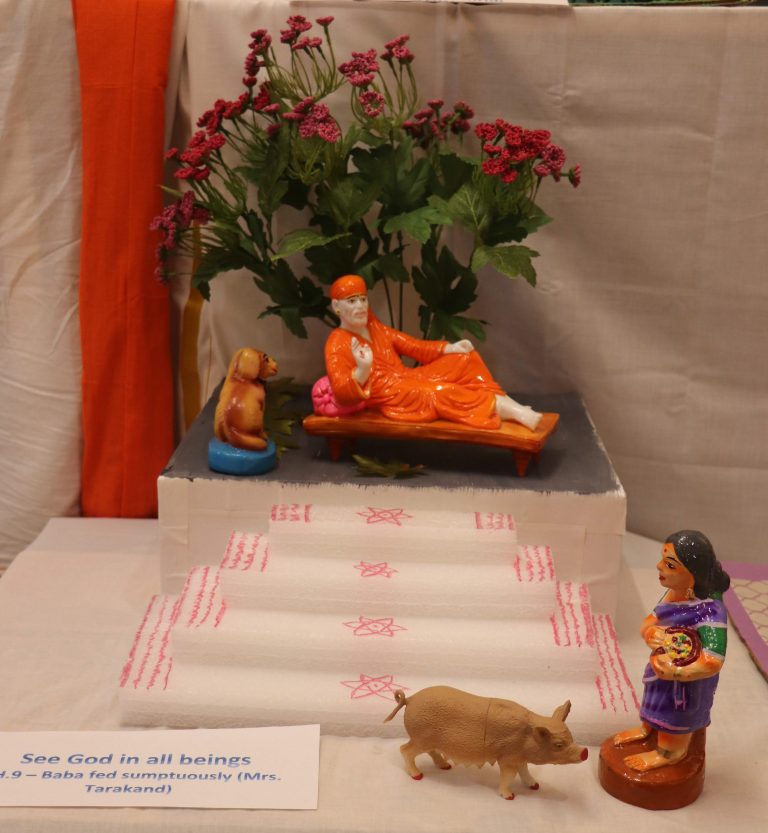Nine Divine Plays of Sai
Nava Sai Leelas
Sai Baba of Shirdi, also known as Shirdi Sai Baba, was an Indian spiritual master who was regarded by his devotees as a saint, fakir, and satguru, according to their individual proclivities and beliefs. He was revered by both his Hindu and Muslim devotees, and it was uncertain if he was a Hindu or a Muslim. This, however, was of no consequence to Sai Baba. He stressed the importance of surrender to the true guru who will lead the disciple through the right path in the life.
Sai Baba is worshipped by people around the world. He had no love for perishable things and his sole concern was realization of the self.
He gave no distinction based on religion or caste. Sai Baba’s teaching combined elements of Hinduism and Islam; he gave the Hindu name Dwarakamayi to the mosque in which he lived, practiced Muslim rituals, taught using words and figures that drew from both traditions, and was buried in Shirdi. One of his well known epigrams, “Sabka Malik Ek” (“One God governs all”), is associated with Hinduism, Islam and Sufism. He also said, “Trust in me and your prayer shall be answered.” He always uttered “Allah Malik” (“God is King”). His life story was published as a book “Sai Sat Charitha”. Nine stories from his life have been depicted in the kolu.
Coming to Shirdi
Chapter 5 – Pointing Chand Patil’s Mare
There lived in the Aurangabad District, in a village called Dhoop, a wealthy Muslim gentleman named Chand Patil. He lost his mare while he was making a trip to Aurangabad .He had diligently searched for two long months but couldn’t find the mare.
He started his way back home with the saddle on his back. After travelling for about 8 miles he saw a mango tree . He saw somone sitting under the tree. The person had a cap on His head, wore Kafni (long robe) and had a “Satka” (short stick) under His armpit and He was preparing to smoke a Chilim (pipe). This man looked like a Fakir ( A muslim religious ascetic who lives solely on alms).
On seeing Chand Patil pass by the way, He called out to him and asked him to have a smoke and to rest a little. The Fakir asked him about the saddle. Chand Patil replied that it was of his mare, which was lost. The Fakir asked him to make a search in the lake close by.
When Chand Patil went there, He was amazed to see the mare grazing near the lake .Chand Patil immediately understood that this Fakir was not an ordinary man, but an Avalia (a great saint). He returned to the Fakir with the mare. Chand Patil requested the Fakir to come to his home and accept his hospitality.
Next day the Fakir went to the Patil’s house and stayed there for some time. The Patil was a village – officer of Dhoop. His nephew was to be married and the bride was from Shirdi. So Patil made preparations to start for Shirdi for the marriage. The Fakir also accompanied the marriage-party. The marriage went off without any hitch, the party returned to Dhoop, except the Fakir alone stayed in Shirdi, and remained there forever. When the marriage – party came to Shirdi, it alighted at the foot of a Banyan tree in Bhagat Mhalsapati’s field near Khandoba’s temple. As the members of the party descended one by one, and the Fakir also got down. Bhagat Mhalsapati saw the young Fakir getting down and addressed Him “YA SAI” (Welcome Sai). Others also addressed Him as Sai and thenceforth he became known as Sai Baba
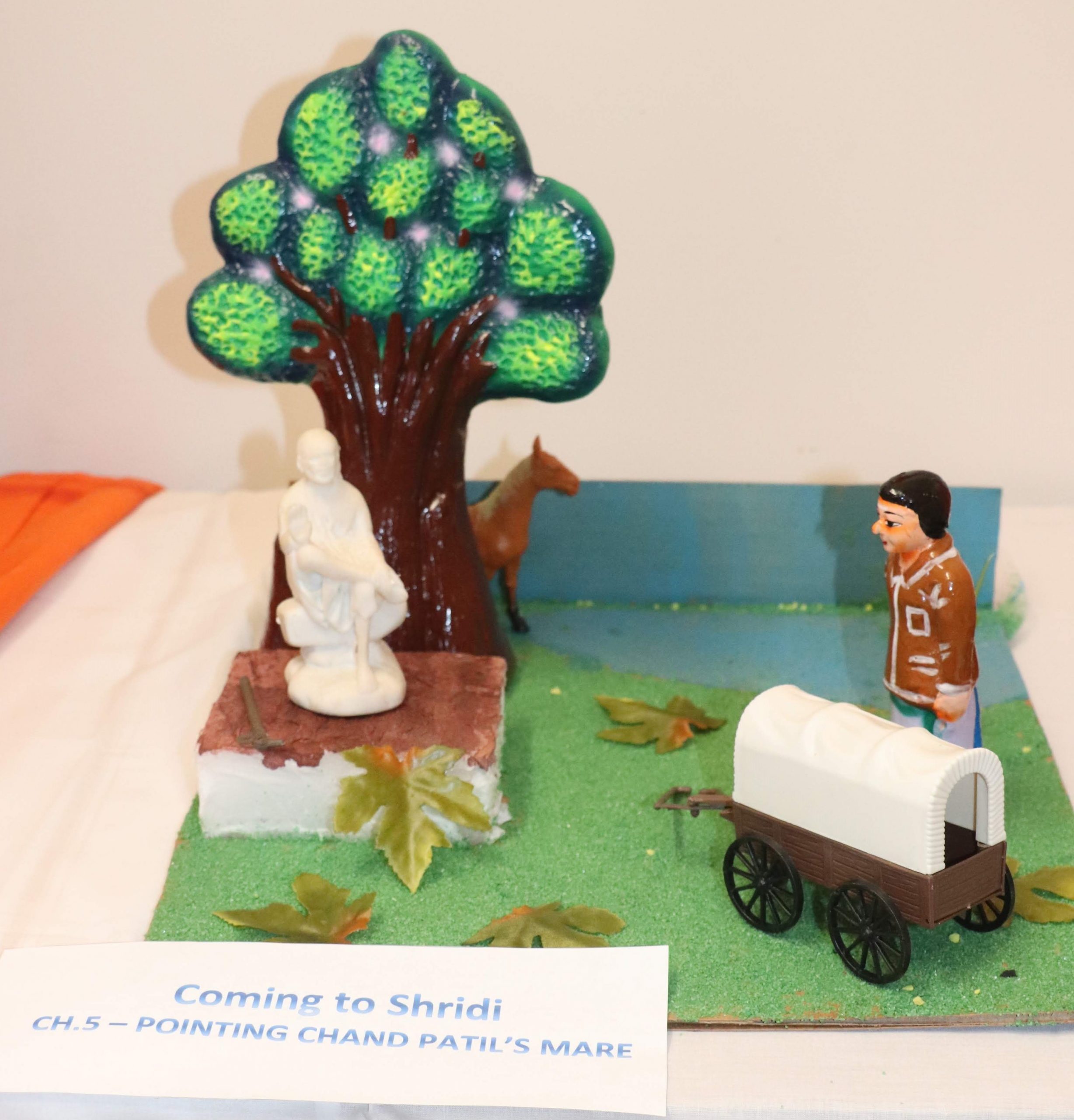
Be Truthful
Chapter 5 – Turning water into oil at Dwarakamai
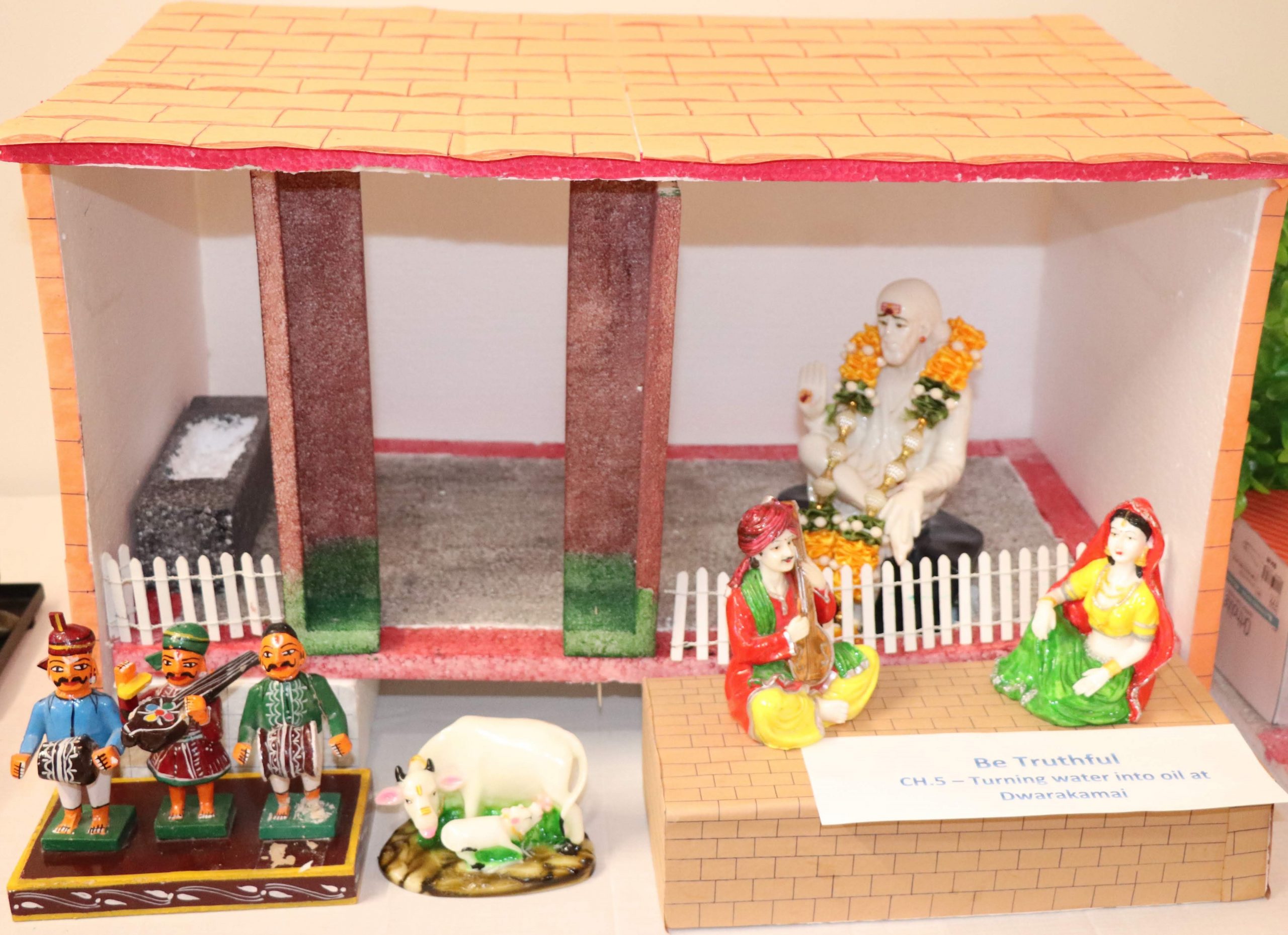
Giving food is the best charity
Chapter 38 – Baba’s Handi
Different sadhanas (means of accomplishments) are prescribed in our scriptures for different ages. Tapa (Penance) is recommended for Krita age, Jnana (Knowledge) for Treta age, Yajna (Sacrifice) for Dwapara age and Dana (Charity) for Kali (present) age. Of all the charities, giving food is the best one. We are much perturbed when we get no food . Other beings feel similarly under similar circumstances. Knowing this, he who gives food to the poor and hungry, is the best donor or charitable person. The Taittiriya Upanishad says that “Food is Brahma; from food all the creatures are born and having been born, by food they live, and having departed, into food again they enter.” When an Atithi (uninvited guest) comes to our door at noon, it is our bounden duty to welcome him by giving him food. Other kinds of charities, viz., giving away wealth, property and clothes etc., require some discrimination, but in the matter of food, no such consideration is necessary. Let anybody come to our door at noon, he should be served forthwith; and if lame, crippled, blind and diseased paupers come, they should be fed first and the able-bodied persons and our relations afterwards. The merit of feeding the former is much greater than that of feeding the latter. Other kinds of charities are imperfect without this Anna-dana (giving of food) as stars are without the moon, a necklace without its central medal, a crown without pinnacle, a tank without a lotus, bhajan without love, a married lady without the kumkum-mark, singing without a sweet voice or butter-milk without salt. Just as varan (Pulse-soup) excels all other dishes, Anna-dana is the best of all merits.
Baba required very little food for Himself and what little He wanted, was obtained by begging from a few houses. But when He took it into His mind to distribute food to all, He made all preparations from beginning to end, Himself. He depended on nobody and troubled none in this matter. First He went to the bazar and bought all the things, corn, flour, spices etc., for cash. He did also the grinding. In the open courtyard of the Masjid, He arranged a big hearth and after lighting a fire underneath kept a Handi over it with a proper measure of water. There were two kinds of Handi, one small and the other big. The former provided food for 50 persons, the later for 100. Sometimes He cooked ‘Mitthe Chaval’ (sweet rice), and at other times ‘pulava’ with meat. At times in the boiling varan (soup), He let in small balls of thick or flat breads of wheat flour. He pounded the spices on a stone-slab, and put the thin pulverized spices into the cooking-pot. He took all the pains to make the dishes very palatable. He prepared ‘Ambil’ by boiling jawari-flour in water and mixing it with butter-milk. With the food He distributed this Ambil to all alike. To see whether the food was properly cooked or not, Baba rolled up the sleeve of His Kafni and put His bare arm in the boiling cauldron without the least fear, and churned (moved) the whole mass from side to side and up and down. There was no mark of burn on His arm, nor fear on His face. When the cooking was over, Baba got the pots in the Majid, and had them duly consecrated by the moulvi. First He sent part of the food as prasad to Mhalasapati and Tatya Patil and then He served the remaining contents with His own hand to all the poor and helpless people to their hearts’ content. Really blessed and fortunate must be those people who got food prepared by Baba and served by Him.
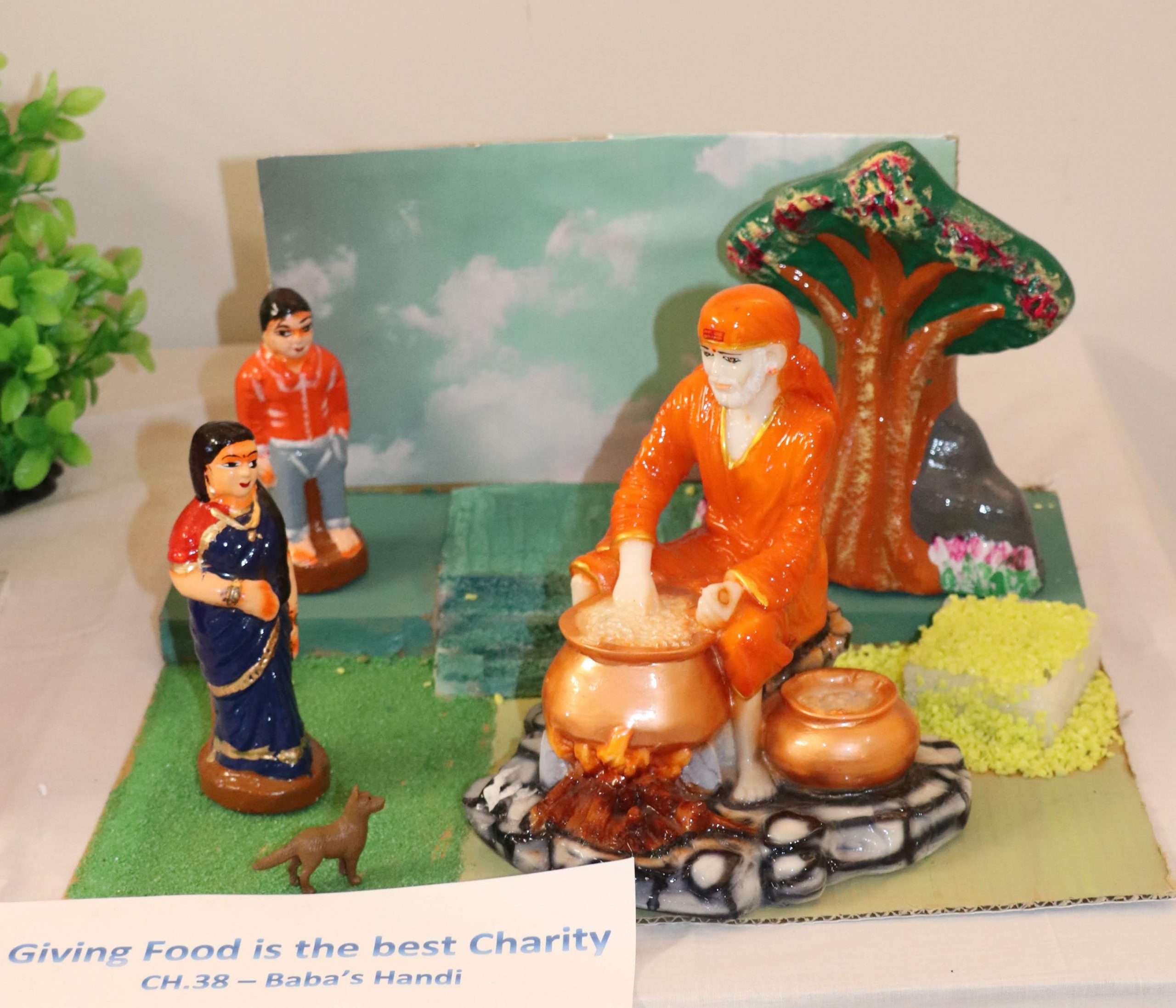
Guru is the destiny for everything
Chapter 4 – Das Ganu’s bath in Prayag
The Hindus think that a bath in the holy Tirth of Prayag, at the confluence of River Ganga and River Yamuna meet, is very meritorious and thousands of pilgrims visit there to take a dip there which is considered very sacred.
Das Ganu, one of Sai Baba’s ardent devotee thought that he should go to Prayag for a bath, and came to Baba to get His permission for doing so. Baba replied to him – “It is not necessary to go so long. Our Prayag is here, believe me.”
Then wonder of wonders! When Das Ganu placed his head on Baba’s Feet, out came or flowed streams, of Ganga – Yamuna water, from both the toes of Baba. Seeing this miracle, Das Ganu was overwhelmed with feelings of love and adoration and was full of tears. Inwardly, he felt inspired, and his speech burst forth into a song in praise of Baba and His Leelas.
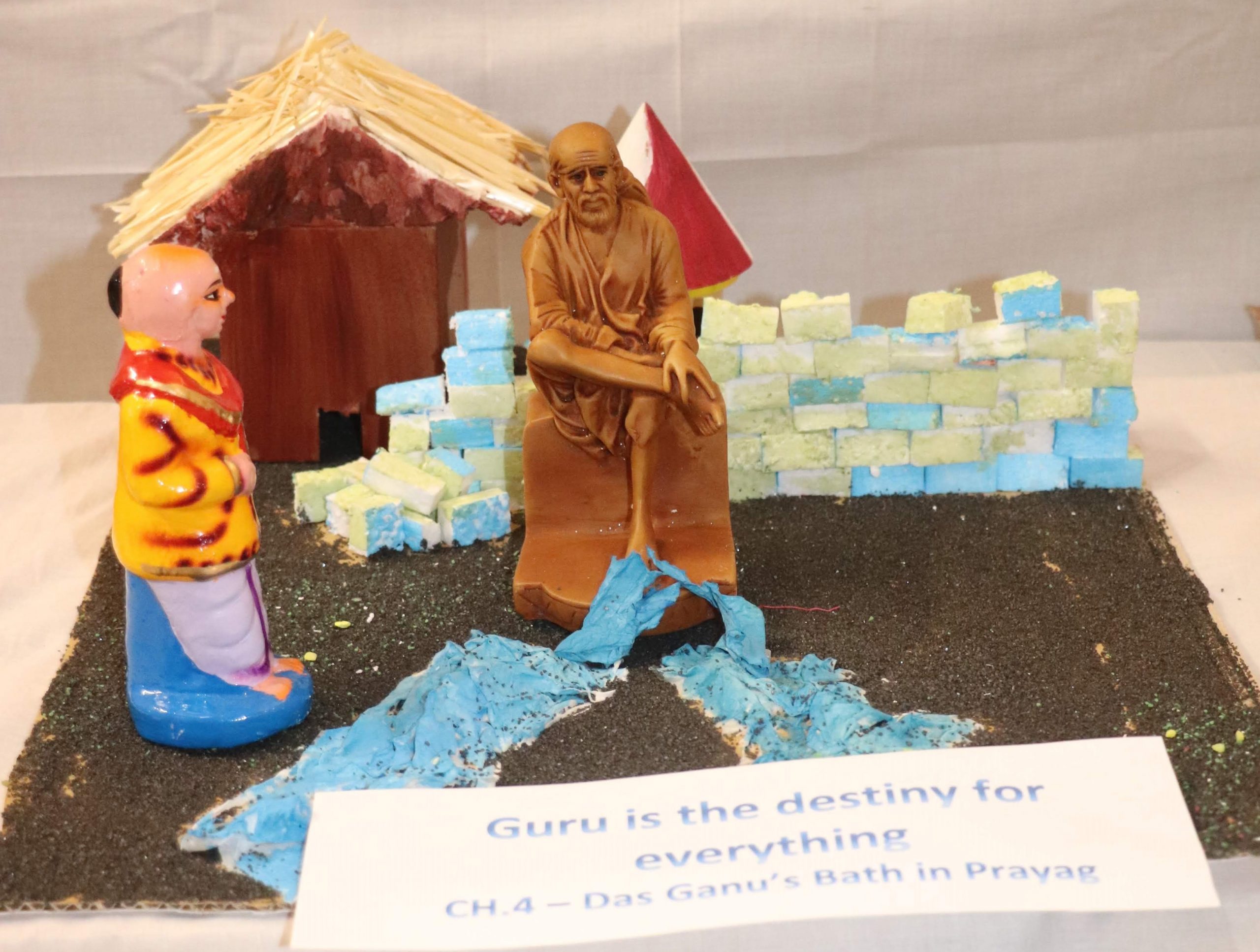
Good deeds leads to liberation
Chapter 31 – Sai giving moksha to tiger
Once a country-cart and stopped in front of the Masjid. A tiger was on the cart, fastened with iron chains, with its fierce face turned to the rear. It was suffering from some pain or agony.
Its keepers – three Derveshis – were taking it from place to place and making money by exhibiting it. It was the means of their subsistence. They tried all sorts of remedies to cure it from the malady it was suffering from, but all was in vain. Then they heard of Baba’s fame and came to Him with the animal.
They got it down the chains in their hands and made it stand at the door. It was naturally fierce, besides, disease ridden. So it was restless. The people began to look at it with fear and amazement. The Derveshies went in, told Baba everything about the animal and with His consent, brought it before Him. As it approached the steps, the tiger was taken aback on account of the lustre of Baba and hung its head down. When both saw each other, it got on the step and looked at Baba with affection.
Immediately it moved the tuft of its tail and dashed it thrice against the ground and then fell down senseless. On seeing it dead the Derveshis were first much dejected and full of sorrow, but on mature thought they came to their senses.
They considered that as the animal was diseased and nearing its end, it was very meritorious on the tiger’s part that it should meet its death at the feet and in the presence of Baba. They understood that the tiger was their debtor, and when the debt was paid off it was free and met its end at Sai’s Feet.
Baba then said, “This was a great bhakta of Lord Shiva. He has gone to Kailash (Lord Shiva’s abode). Now bury his mortal remains in front of Shiva”. The tiger was buried in Shirdi as per Sai’s direction and even today his tomb can be visited.
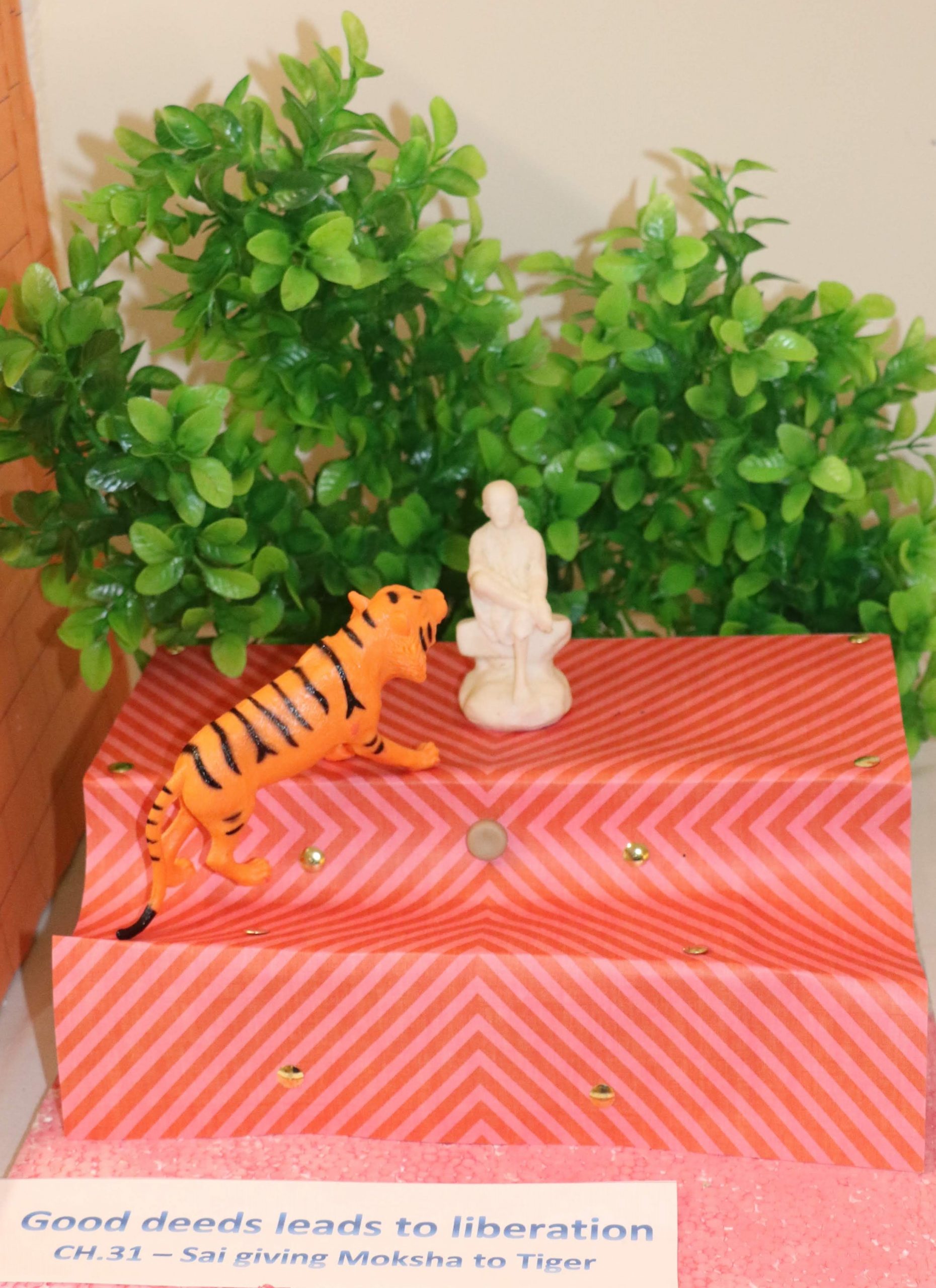
Fear not , you will be saved
Chapter 1 – Sai driving cholera away
It was sometime after 1910 A.D. that I went, one fine morning, at the Masjid in Shirdi, Sai Baba began to make preparations for grinding wheat. He spread a sack on the floor; and thereon set a hand-mill. He took some quantity of wheat in a winnowing fan, and then drawing up the sleeves of His Kafni (robe); and taking hold of the peg of the hand-mill, started grinding the wheat by putting a few handfuls of wheat in the upper opening of the mill and rotated it.
People gathered around the Masjid thought ‘what business Baba had with the grinding of wheat, when He possessed nothing and stored nothing, and as He lived on alms!’, but none had the courage to ask baba what He was doing.
Four bold women, from the crowd, forced their way up and pushing Baba aside, took forcibly the peg or handle into their hands, and, singing Baba’s Leelas, started grinding. At first Baba was enraged, but on seeing the women’s love and devotion, He was much pleased and began to smile. While they were grinding, they began to think that Baba had no house, no property, no children, none to look after, and He lived on alms, He did not require any wheat-flour for making bread or roti, what will He do with this big quantity of flour? Perhaps as Baba is very kind, He will distribute the flour amongst us. Thinking in this way while singing, they finished the grinding and after putting the hand-mill aside, they divided the flour into four portions and began to remove them one per head.
Baba, Who was calm and quiet up till now, got wild and started abusing them saying, “Ladies, have you gone mad? Whose father’s property are you looting away? Have I borrowed any wheat from you, so that you can safely take the flour? Now please do this. Take the flour and throw it on the village border limits.”
On hearing this, the women felt abashed and whispering amongst them, went away to the outskirts of the village and spread the flour as directed by Baba.
It was later understood by the Shirdi people that the Cholera Epidemic which was spreading in the village was ground to pieces and pushed out of the village. From this time onward, the Cholera Epidemic subsided and the people of the village were happy.
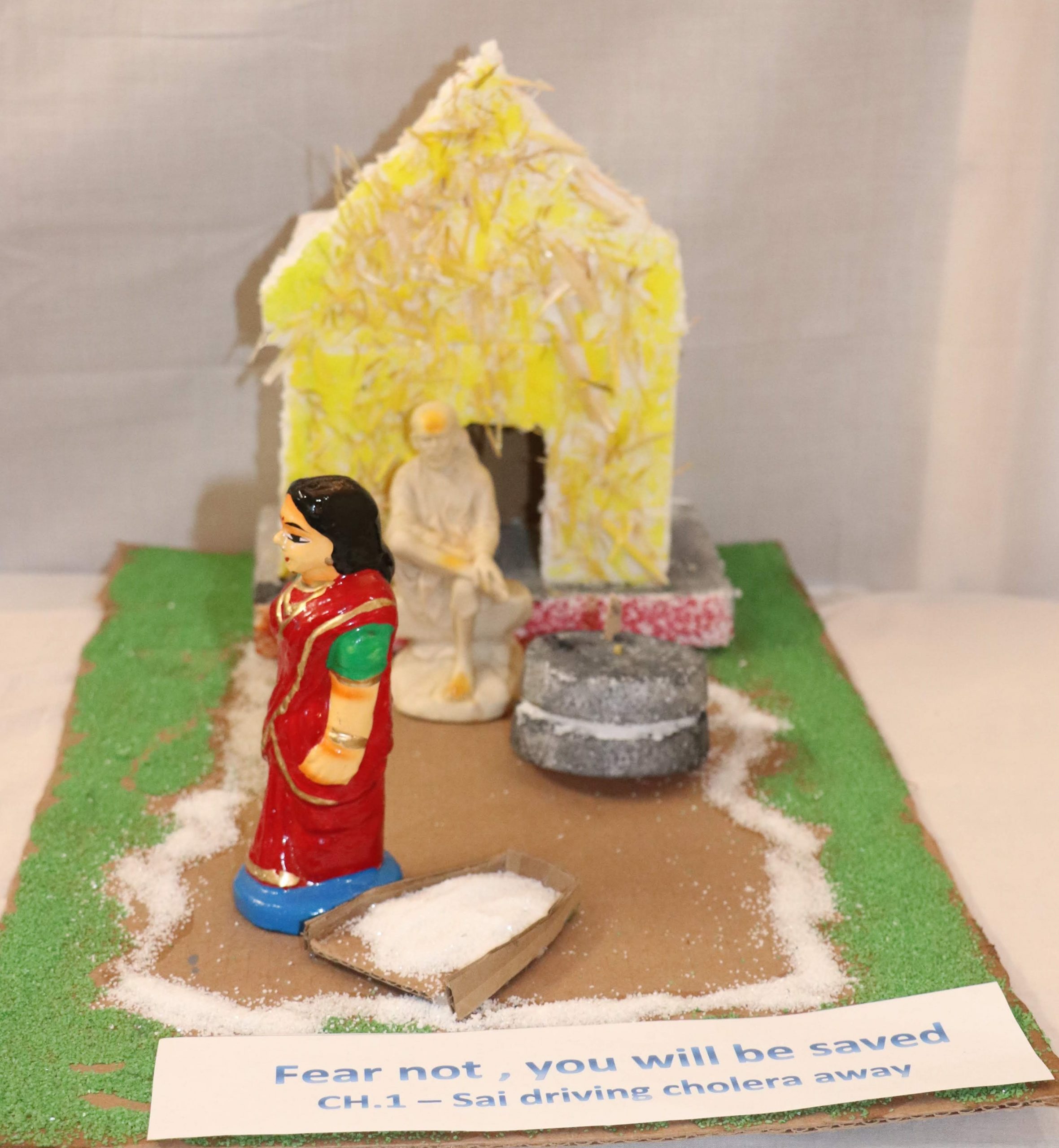
Greed for money drags man to lowest level
Chapter 47 – Story of Veerabhadrappa and Chennabassappa
Sai Baba said – “One morning after taking My breakfast I strolled along till I came to a small river bank. As I was tired, I rested there, washed My hands and feet and had a bath and felt refreshed. There was a foot-path and a cart-track sheltered by shady trees. The breeze was also blowing gently. As I was preparing to smoke chillim (pipe), I heard the croaking of a frog. I was striking the flint and lighting the fire, when a traveller turned up, sat by My side, bowed to Me and politely invited Me to his house for meals and rest. He lit up the pipe and handed it over to Me. The croaking was heard again and he wanted to know what it was. I told him that a frog was in trouble and was tasting the bitter fruit of its own karma. We have to reap now the fruit of what we sow (do) in our past life, and there is no use in crying about it. Then he smoked and handed over the pipe to Me and said that he would go there in person and see for himself. I told him that a frog was caught by a big snake and was crying. Both were very wicked in their past life and were now reaping the fruit of their actions in these bodies. He went out and found that a huge black serpent was holding a big frog in its mouth.
He turned to Me and said that in about 10 or 12 minutes the frog would be eaten up by the snake. I said, “No, this can’t be. I am its father (protector) and I am here now. How shall I allow the snake to eat it up, am I here for nothing? Just see how I release it.”
After smoking again, we walked on to the place. He was afraid and asked Me not to proceed further as the snake might attack us. Not minding him, I went ahead and addressed the creatures thus:- “Oh Veerbhadrappa, has not your enemy Bassappa yet repented though he has been born as a frog, and you too, though born as a serpent, still maintain bitter enmity against him? Fie upon you, be ashamed, give up your hatred now and rest in peace.”
Hearing these words, the snake left the frog quickly and dived into the river and disappeared. The frog also jumped away and hid itself in the bushes.
The traveller was much surprised; he said that he could not understand how the snake dropped the frog and disappeared at the words uttered, who was Veerbhadrappa and who was Basssappa, and what was the cause of their enmity. I returned with him to the foot of the tree and after sharing a few puffs of smoke with him I explained the whole mystery to his as follows:-
There was ancient holy place sanctified by a temple of Mahadev about 4 or 5 miles from My place. The temple was old and dilapidated. The residents of the place collected funds for its repairs. After a large amount was collected, arrangement for worship was made and plans with estimates for repairs were prepared. A rich local man was appointed the Treasurer and the whole work was entrusted to him. He was to keep regular accounts and be honest in all his dealings. He was a first class miser and spent very little for the repairs, which consequently made very little progress. He spent all the funds, swallowed some amount himself and spent nothing from his pocket. He had a sweet tongue and was very clever in offering plausible explanations regarding the poor and tardy progress of the work. The people again went to him and said that unless he lent his helping hand and tried his best, the work would not be complete. They requested him to work out the scheme and again collected subscriptions and sent the amount to him. He received it, but sat as quiet as before without making any progress. After some days, God (Mahadev) appeared in his wife’s dream and said to her – “You get up, build the dome of the temple, I will give you a hundred-fold of what you spend.” She told this vision to her husband. He was afraid that it would involve him in some expenses and therefore laughed it out saying that it was a mere dream, a thing not to be relied and acted upon, or else why did not God appear to him and tell him? Was he far off from her? This looks like a bad dream, having for its object the creation of ill feeling between husband and wife. She had to remain quiet.
God does not like big subscriptions and donations collected against the wishes of the donors, but He likes ever trifling amounts given with love, devotion and appreciation. Some days after, God again appeared in her dream and said – “Do not bother yourself about your husband and the collections with him. Don’t press him to spend any amount for the temple. What I want is, feeling and devotion. So give, if you like, anything of your own.” She consulted her husband about this vision and decided to give God her ornaments given by her father. The miser felt disconcerted and decided to cheat even God in this item. He undervalued the ornaments at Rs.1,000/- and bought them himself and in lieu of the amount gave a field to God as endowment or security. The wife agreed to this. The field or land was not his own, it belonged to one poor woman named Dubaki who mortgaged it to him for Rs.200/-. She was not able to redeem it for long. So the cunning miser cheated all, his wife, Dubaki and even God. The land was sterile, uncultivated and worth nothing and yielded nothing, even in best seasons.
Thus ended this transaction and the land was given in the possession of the poor priest who was pleased with the endowment. Sometime later on, strange things happened. There was a terrific storm and heavy down-pour of rain; lightning struck the house of the miser, when he and his wife both died. Dubaki also breathed her last.
In the next life, the rich miser was born at Mathura in a Brahmin family and was named Veerbhadrappa. His devout wife was born as the daughter of the priest of the temple and was named Gouri. The woman Dubaki (the mortgagor) was born as a male in the family of the Gurav (attendent) of the the temple and was named Chenbassappa. The priest was a friend of Mine, He often came to Me, chatted and smoked with Me. His daughter Gouri was also devoted to Me. She was growing fast and her father was seeking a good husband for her. I told him not to worry about this as the bridegroom himself would come seeking her. Then there came a poor boy named Veerbhadrappa of their caste, wandering and begging his bread to the priest’s house. With My consent Gouri was given in marriage to him. He was also at first devoted to Me as I recommended his marriage with Gouri. Even in this new life he was hankering after money and asked Me to help him to get it as he was leading a married man’s life.
Strange things happened. There was a sudden rise in prices. By Gouri’s good luck, there was a great demand for land and the endowment land was sold for one lakh of rupees (100 times the worth of her ornaments). Half the amount was paid in cash and the remaining was to be paid in 25 instalments of Rs. 2,000/- each. All agreed to this transaction, but began to quarrel over the money. They came to Me for consultation. I told them that the property belonged to God and was vested in the priest and Gouri was his sole heiress and proprietress and no amount should be spent without her consent and that her husband had no right whatsoever to the amount. Hearing my opinion Veerbhadrappa was wroth with Me and said that I wanted to establish Gouri’s claim and embezzle her property. Hearing his words, I remembered God and kept quiet. Veerbhadrappa scolded his wife (Gouri) and she came to Me at noon and requested Me not to mind the words of others and not to discard her as she was My daughter. As she thus sought My protection I gave her a pledge that I would cross seven seas to help her. Then that night Gouri had a vision. Mahadev appeared in her dream and said – “The whole money is yours, do not give anything to anybody, spend some amount for temple purposes in consultation with Chenbassappa and if you want to use it for some other purpose, consult Baba in the Masjid (Myself).” Gouri told Me the vision and I gave her the proper advice in the matter. I told her to take the principal or capital amount to herself, give half the amount of interest to Chenbassappa and that Veerbhadrappa had nothing to do in the matter. While I was thus talking, both Veerbhadrappa and Chenbassappa came there quarreling. I tried My best to appease them and told them God’s vision to Gouri. Veerbhadrappa got wild and angry and threatened to kill Chenbassappa cutting him to pieces. The latter was timid, he caught my feet and sought my refuge. I pledged Myself to save him from the wrath of his foe. Then after some time Veerbhadrappa died and was born as a snake and Chenbassappa died and was born as a frog. Hearing the croaking of Chenbassappa and remembering my pledge, I came here, saved him and kept My word. God runs to His devotees for help in times of danger. He saved Chenbassappa (the frog) by sending Me here. All this is God’s Leela or sport.”
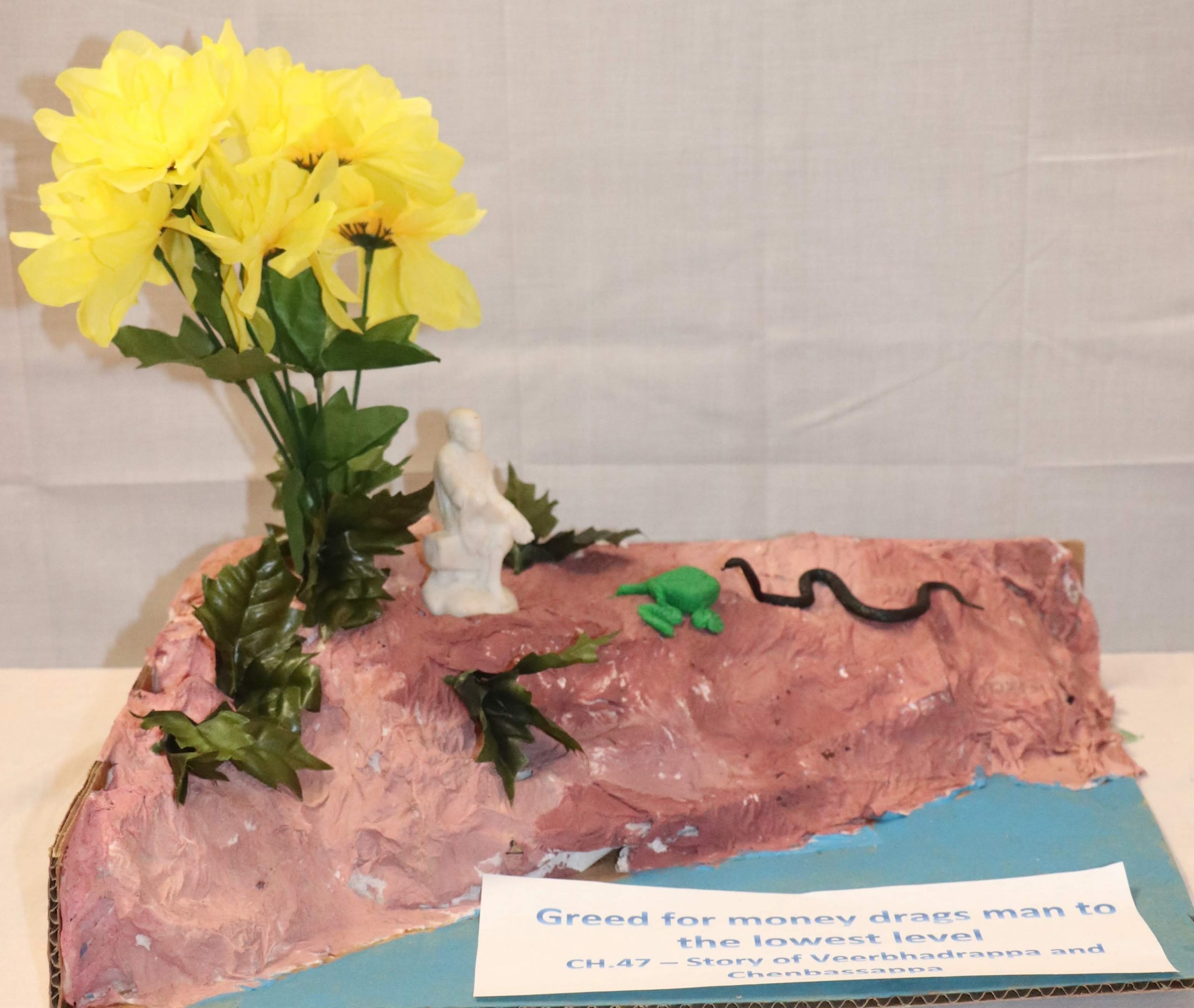
Have Faith and Perseverance
Chapter 12 – Baba’s darshan as Sri Rama to doctor
Once a Mamlatdar came to Shirdi with a doctor friend of his. The Doctor said that his Deity was Rama and that he would not bow before a Muslim, and so, he was unwilling to go to Shirdi. The Mamlatdar replied, that nobody would press him to make a bow, nor would ask him to do so. So he should come and give the pleasure of his company.
Accordingly, they came to Shirdi, and went to the Masjid for Baba’s darshan. All were wonder-struck to see the Doctor going ahead and saluting Baba. They asked him how he forgot his resolve and bowed before a Muslim. Then the Doctor replied that he saw his beloved Deity, Rama, on the seat and he, therefore prostrated himself before Him. Then as he was saying this, he saw Sai Baba there again. Being dismayed, he said, “Is this a dream? How could He be a Muslim? He is a great Yogasampanna (full of Yoga) Avatar.”
Next day, he made a vow and began to fast. He absented himself from the Masjid, resolving not to go there, until Baba blessed him. Three days passed and on the fourth day, a close friend of his from Khandesh, turned up, and with him, he went to the Masjid for Baba’s darshan. After the salutation, Baba asked him, whether anybody had gone to call him, so that he had come. Hearing this vital question, the doctor was moved. The same night he was blessed by Baba, and he experienced the Bliss supreme, in his sleep. Then he left for his town, where the experienced the same state of a fortnight. Thus his devotion to Sai Baba increased manifold.
The moral of the story is this that we should have firm faith in our Guru.
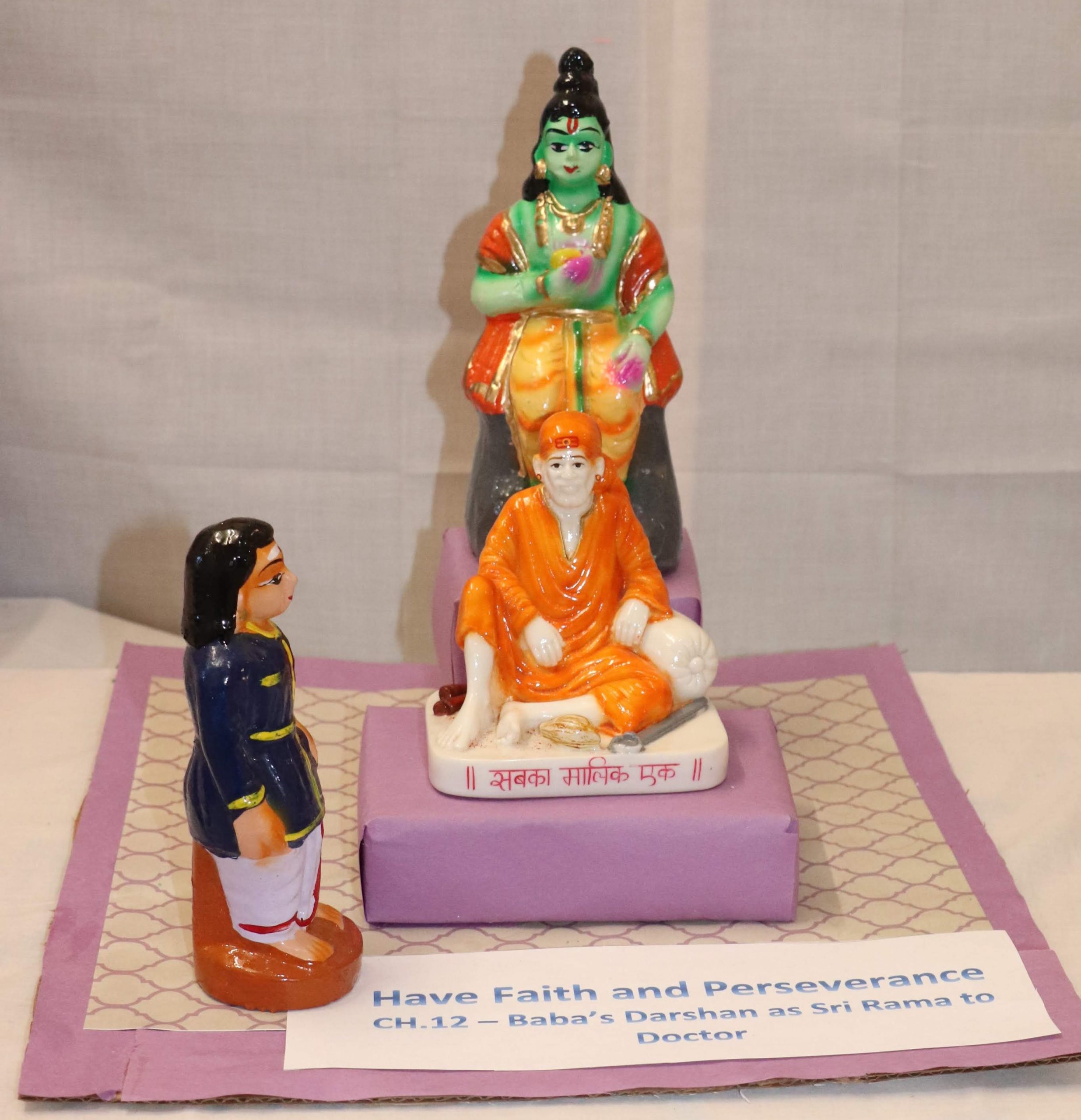
See God in all beings
Chapter 9 – Baba fed sumptuously (Mrs. Tarakand)
Once, Mrs. Tarkhad was staying in a certain house in Shirdi. At noon, meals were ready and dishes were being served, when a hungry dog turned up there and began to cry, Mrs. Tarkhad got up at once and threw a piece of bread, which the dog gulped with great relish.
In the afternoon, when she went to the Masjid and sat at some distance, Sai Baba said to her, “Mother, you have fed Me sumptuously up to my throat, My afflicted pranas (life-forces) have been satisfied. always act like this, and this will stand you in good stead. Sitting in this Masjid I shall never, never speak untruth. Take pity on Me like this. First give bread to the hungry, and then eat yourself. Note this well.”
She could not at first understand the meaning of what Baba said. So she replied — “Baba, how could I feed You? I am myself dependent on others and take my food from them on payment.”
Then Baba replied — “Eating that lovely bread I am heartily contended and I am still belching. The dog which you saw before meals and to which you gave the piece of bread is, one with Me, so also other creatures (cats, pigs, flies, cows etc.) are one with Me. I am roaming in their forms. He, who sees Me in all these creatures is My beloved. So abandon the sense of duality and distinction, and serve Me, as you did today.”
Drinking these nectar-like words, she was moved, her eyes were filled with tears, her throat was choked and her joy knew no bounds.
“See God in all beings” is the moral of this story.
